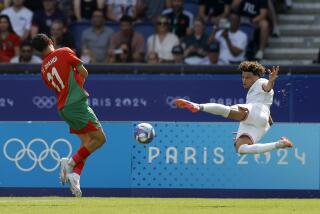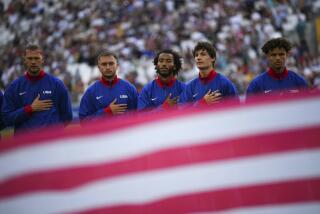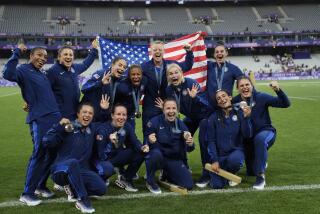U.S. gets reduced to the bait again in a frustrating Rugby World Cup
- Share via
BRIGHTON, England -- The United States, a minnow in English parlance, ached to become at least a guppy but remains a bummed-out minnow.
It’s ruthless in the rugby sea, as reiterated across the Channel in France on Wednesday, when some strapping Pacific islanders from Tonga ate the U.S., 25-15, in the Americans’ second match of the Rugby World Cup.
Only six days into a 44-day event, barely had American rugby apprentices around the globe had time to sit down in pubs and annoy rugby intellectuals with inquiries about arcane terms such as lineout, flyhalf, blindside flanker and rolling maul, when now they tell us . . . Now they tell us the U.S. effectively has become an eliminated minnow even with two matches left.
It’s such a harsh domain, rugby, so haves and have-nots, that losses to Samoa and South Africa already have gone to the printers even though the U.S. won’t play the former until Sept. 26 or the latter until Sept. 30. It’s so whale-eat-minnow that organizers already booked the Americans home on a flight at 4 a.m. after their last match, according to London’s Observer.
Any flight that early, leaving Paris, qualifies as creatively sadistic.
Tonga’s behemoths, however, do fall shy of the sport’s behemoths, ranking No. 14 on Earth to the Americans’ No. 15. When the U.S. hurtled into Group A with England, South Africa, Samoa and Tonga, it realistically yearned to beat the weakest of the four -- Tonga -- for a first U.S. World Cup victory over Anybody Other Than Japan. Having scared Fiji in 2003 in South Africa before bowing by an excruciating 19-18, the U.S. hoped to molt old skin -- or even scales.
It started promisingly last Saturday against England in a 28-10 loss contested enough that it set English observers to one of their favorite pastimes -- fretting -- but one dose of that very spunk cost the U.S. its center, Paul Emerick, the native Iowan resident of Wales. He got a five-week suspension for tipping an airborne England flyhalf Olly Barkley onto the ground on his neck.
Barkley continued playing, but apparently that’s quite the infraction, so Emerick sat out as the U.S. had to play Tonga only five days after playing England, because the sport is inhumane to minnows on the pitch and off, as detailed in an outspoken complaint from John Kirwan, coach of fellow minnow Japan.
As for Tonga, if you’re flying from Los Angeles to New Zealand, studying the in-flight progress map and noticing only water with just a few land dots, those land dots might well be Tonga, provided they’re not Fiji or Samoa. Tonga has about 100,000 people living on 96 of its 169 islands, and its most famous athlete, super-heavyweight boxer Paea Wolfgram, regaled reporters at the Atlanta Olympics in 1996 when he won the silver medal and explained that his countrymen and women supported him partly by fasting.
It also had possibly the most remarkable being in world history, Tui Malila, a tortoise the British explorer Captain Cook brought from Madagascar as a gift to Tonga’s royal family in either 1773 or 1777, and who then lived either 188 or 192 years, before dying on May 19, 1965, of natural causes.
As would we all.
On Wednesday in Montpellier, France, Tonga ran its all-time World Cup win total to three by defeating a U.S. team whose roster boasts four Tongan-born players. Tonga Coach Quddus Fielea called it a magical moment. Finau Maka made his debut for Tonga and scored a try in only 71 seconds when, as the Associated Press described, Maka dived over from close range after the Tongan pack formed a rolling maul following a lineout conceded by the Americans.
From a 13-0 deficit, the U.S. was game but fell to that Tongan rolling maul -- a rare rugby tactic in which teams can cluster in front of the ball carrier -- plus all else, then faced a reality noted by U.S. Coach Peter Thorburn.
At the news conference, he said, We are a minnow nation.
More to Read
Go beyond the scoreboard
Get the latest on L.A.'s teams in the daily Sports Report newsletter.
You may occasionally receive promotional content from the Los Angeles Times.










